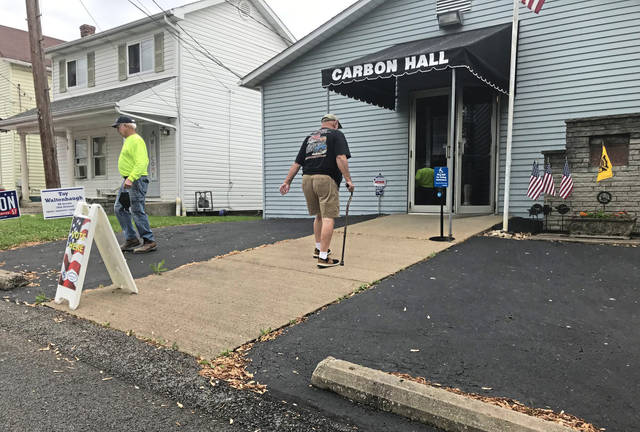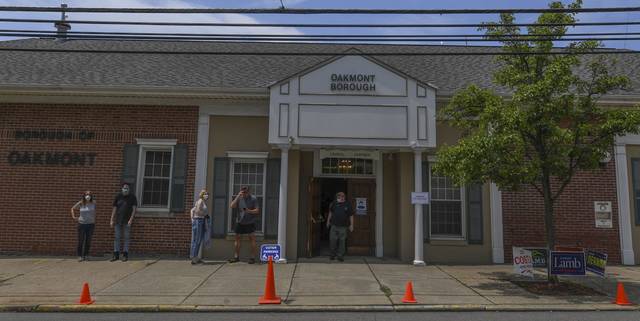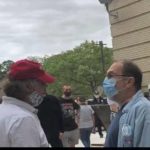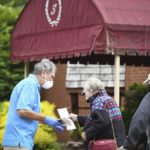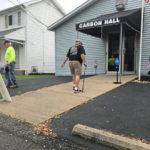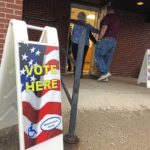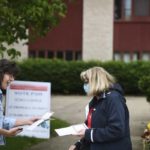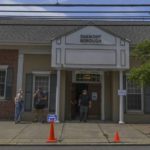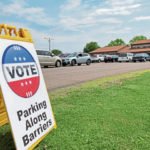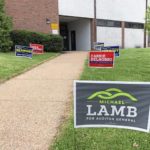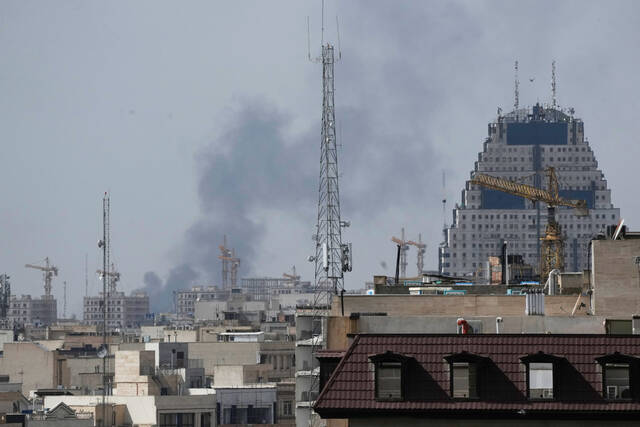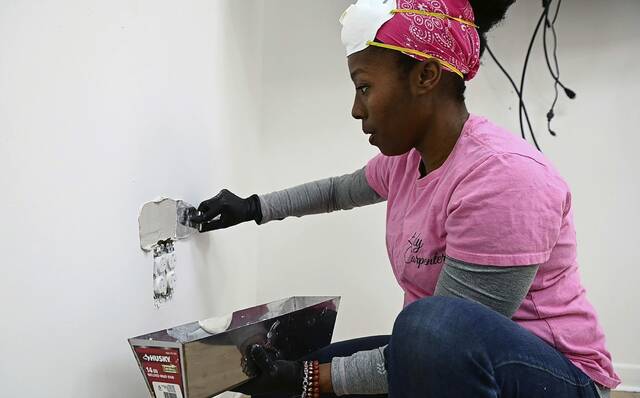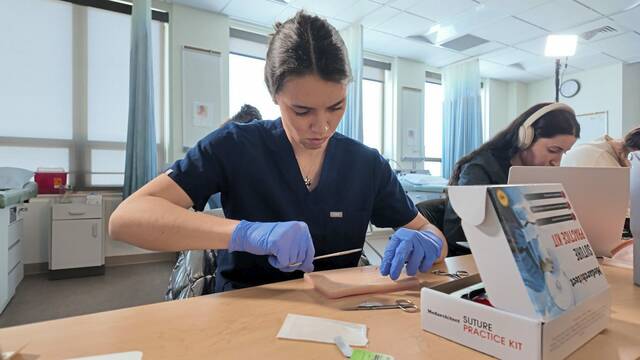A shoving match at the polling place at Allderdice High School in Pittsburgh Tuesday was in stark contrast to what otherwise has been a quiet primary day around Western Pennsylvania.
Allegheny County Spokeswoman Amie Downs said an altercation broke out when voters were arguing with another voter to put on his mask. He began screaming at the others, catching the notice of the constable assigned to the polling place.
Masks are not mandatory for voters, but they are mandatory for poll workers, she said.
The resulting argument included pushing and shoving. Pittsburgh Public Schools and city police were called.
Pam Harbin, a Pittsburgh Public School board member from District 4, was at the polling location as a volunteer. She said a man had been shouting obscenities at passersby before even getting close to the entrance. He approached several campaign volunteers who were at the location to promote their respective candidates to confront them.
Harbin said he began getting close to people’s faces while he yelled. She approached him and asked him to put on his mask, which he had hanging around his neck.
When the argument escalated to a physical altercation, police were called. The voter was advised to vote and leave the premises — no charges were filed.
That was confusing to Harbin.
“He caused a real disruption today, and he was not treated as a disrupter or a criminal or anything like that,” Harbin said.
She reflected on the actions of police the past few days, when peaceful protests erupted into chaos and tear gas was deployed to disperse crowds. She was confused as to why this man, who she said threatened to return to the polling location later, was not arrested.
“The day is about electing a politician to make changes that need to be changed,” she said. “And frankly, this is one of them.”
Downs said the county has received reports of long lines in Brashear and Perry because voters waited to use the voting machine. Downs stressed that while there is a ballot marking device in each precinct for voters who fall under the Americans with Disabilities Act, voting machines are no longer used by the county. Non-ADA voters can still use the ballot marking device, she said, but paper ballots are still the main vehicle for voting. Additional devices were sent to Brashear and Perry.
Elsewhere, voting has been calm with what, so far, is described as a light turnout. Election officials say that could be the result of the popularity of mail-in ballots.
Guy Rubei, judge of elections at Hempfield’s large West Point precinct, is used to seeing lines of voters extending around the building for a presidential primary, but not Tuesday morning.
“I’d say it’s been extremely light. As of 8:45 a.m., we’ve had just 15 … maybe 18 voters. It’s been slow,” Rubei said.
Rubei said he anticipated a much lighter turnout in view of the number of people choosing to vote by absentee ballot as a result of the coronavirus pandemic this spring. But for a presidential primary, Rubei admitted it has been slow.
“There’s a lot of other races, so maybe it will pickup later in the day,” he said.
On a bright note, Rubei said the new voting machines have been working “very well so far.”
“I’d say they are working much better than the older ones,” said Rubei, who has been election judge at the Hempfield precinct for the last four years and a precinct worker for eight years.
Rubei said voters in the precinct used to cast ballots at the West Point fire hall, but polls were relocated to the Life Church at the corner of Slate Run Road and Route 130 for increased space.
“It’s worked out well here too,” he said.
By 3:30 p.m. Tuesday, more than 600 people had voted at Citizens Hose in Harrison, said Tim McCue, judge of elections. The township’s eight or nine voting locations were consolidated into the one at the fire hall.
Complicating matters, McCue said, were voters who had applied for mail-in ballots, but were coming to vote at the fire hall saying they didn’t get them in time. Those persons were having to vote provisionally.
Debbie Cordera walked from her home across the street to the fire hall to vote. Cordera said she had a mail-in ballot, but decided not to use it and didn’t even open it.
“I was talking to friends. We were concerned about people being dishonest and not marking who you really wanted,” she said.
Leah Piper, of Harrison, also didn’t feel comfortable voting by mail. “It’s more secure to do it in-person,” she said.
In Allegheny County, one longtime voter, who waited only five minutes to vote, wasn’t concerned about crowds.
Mario Swanson, 60, of Springdale Township, didn’t go the mail-in-ballot route because he doesn’t totally trust the accounting.
Swanson was more than surprised when he showed up at 9:30 a.m. to vote at the Springdale Township building and found that he would have to cast a paper ballot.
“I didn’t feel right,” he said. “With paper ballots, I’ve seen too much go wrong. Why go from electronic to paper?”
Swanson said he hopes election authorities come up with a voting process that will instill better voter confidence.
“I just hope it’s not like that in November because it doesn’t matter what party wins or loses, they are going to say ‘Oh no, we need a re-count,’” he said. “It’s going to be a big hassle.”
Jeanette Blue-Tyler voted at Holy Martyrs Parish in Tarentum. Filling in ovals on paper to vote reminded her of being in school.
“I like the machines better,” she said.
Pam Hauber, 48, of Cheswick, was also surprised to see paper ballots at her polling station at the Cheswick Volunteer Fire Department .
“I chose to vote in person because I don’t trust mail-in ballot system,” she said. “However voting in person, I don’t trust that system either.” Hauber filled out a sheet of paper, which was inserted in a ballot box.
As of 9 p.m. Tuesday, Downs said 159,820 mail-in and absentee ballots had been scanned. She said the county had received 207,013 mail-in and absentee ballots, including about 16,000 ballots that came in Tuesday’s mail.
About 280,000 mail-in ballots were requested. The process of opening and scanning the ballots received began at 7 a.m. Tuesday.
Cynthia Kramer, the judge of elections in Tarentum, pointed to a secure black box that ballots were going into. Instead of being scanned at the polling location, she said they were going to be taken to a central location to be scanned.
With more than 160 voters by about 4 p.m., Kramer said it was busier than she expected.
“It’s reassuring to see people voting, especially under the circumstances,” she said. “It’s new for all of us.”
Tarentum’s five voting locations were consolidated into one. That meant Betty Davis, who would have voted at Hilltop Hose, had to go to the other side of the borough.
“I just had to get in my car and drive a little bit farther from home,” she said, adding it was no trouble.
Davis, who said she’s on dialysis, wanted to vote by mail, but had to do it in-person — when she realized the ballot she thought she had was just paperwork to get one, it was too late.
“They sent me the thing and I never opened it because I thought it was a ballot,” she said. “I opened it and found it was the questionnaire for the ballot.”
In Westmoreland County, including the Maplewood United Presbyterian Church and the Carbon Volunteer Fire Hall, both in Hempfield, had low turnouts Tuesday morning.
Deborah Ofcansky, 63, who voted at the Maplewood precinct along with her husband, Bill, 63, said she was the 39th person to vote.
“We’re here at 9:46 and I was number 39,” she said. “That’s kind of sad.”
Still, several people, including Dennis Mania, 60, said they were not worried about voting during the pandemic.
“Everybody’s social distancing, everybody’s wearing masks,” Mania said.
Tay Waltenbaugh, the Democratic candidate for the state Senate’s 39th District, sat outside the precinct Tuesday morning, greeting people as they went to vote.
“I think the turnout may be a little low. It’s been a little slow this morning, so I’m hoping it’ll pick up. With the pandemic and so forth and with people working and not working, I think that will have something to do with it also,” he said, adding that a lower turnout could be due to a high number of mail-in ballots that were requested for the primary election.
Waltenbaugh plans on visiting different precincts throughout the day.
In the Hempfield neighborhood of Carbon, few people filtered in and out of the volunteer fire department.
Scott Breegle, 68, said he considered filing a mail-in ballot, but did not send one in time. Still, he made sure to get out and vote.
“I want to make sure that I vote,” he said. “I think it’s a privilege and I like to do it.”
With six precincts combined for voting at the Oakmont borough building, the polls were busy early in the day but no one had more than a 10-minute wait, according to poll worker Linda Turner, 68, of Oakmont.
Turner voted when the crowds died down, casting her paper ballot.
“It was very slick and very easy,” she said. “Using the paper ballot was easier than using the electronic stuff.”
Voters seem to not have a problem with it so far, Turner said. The most common question: “Do I sign it or fold it?”
Polls closed at 8 p.m. in Pennsylvania. Downs said the Election Court ruled that precincts in Penn Hills were allowed to remain open an hour later and anyone in line at that time would be permitted to vote.
Staff writer Teghan Simonton contributed to this report.




